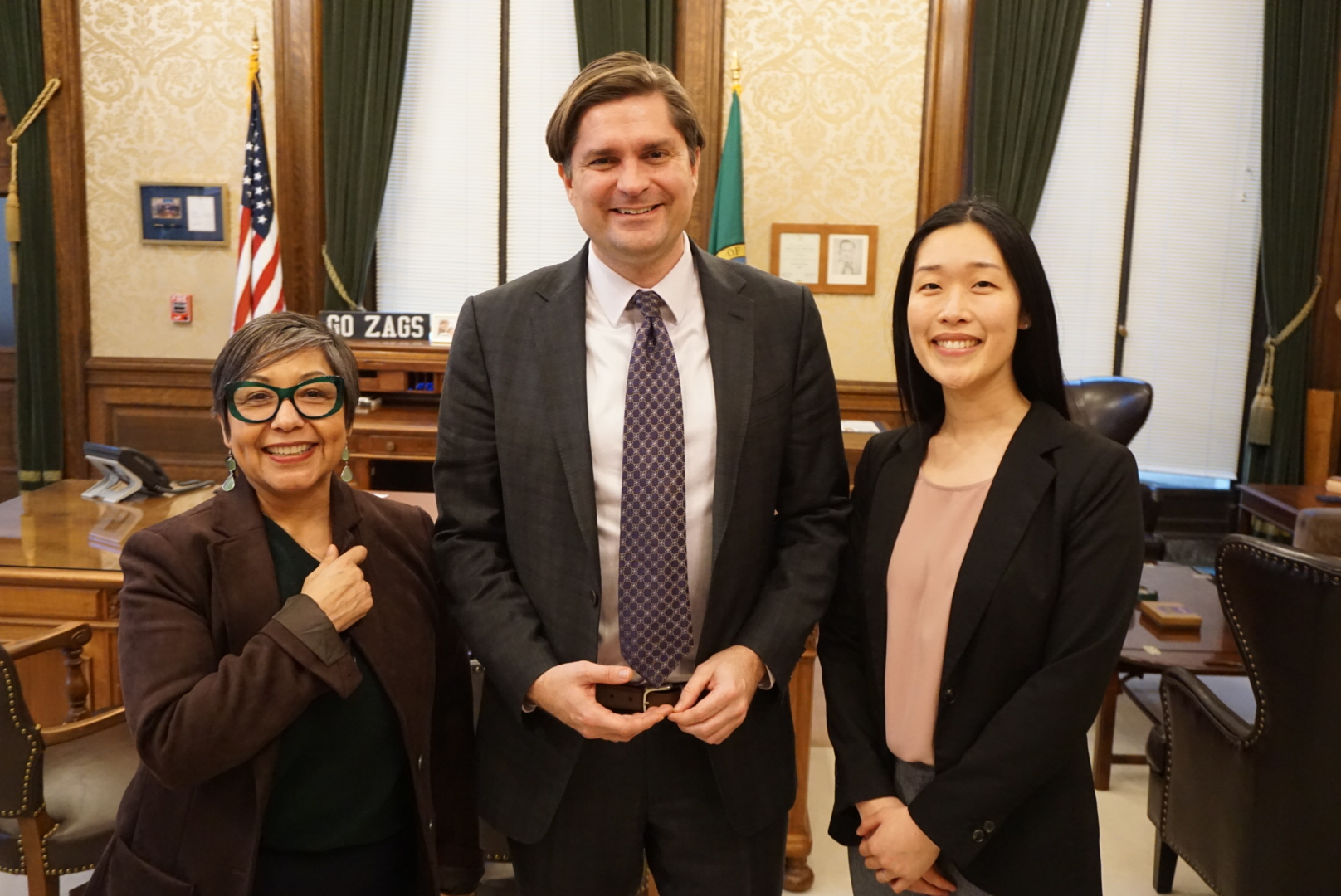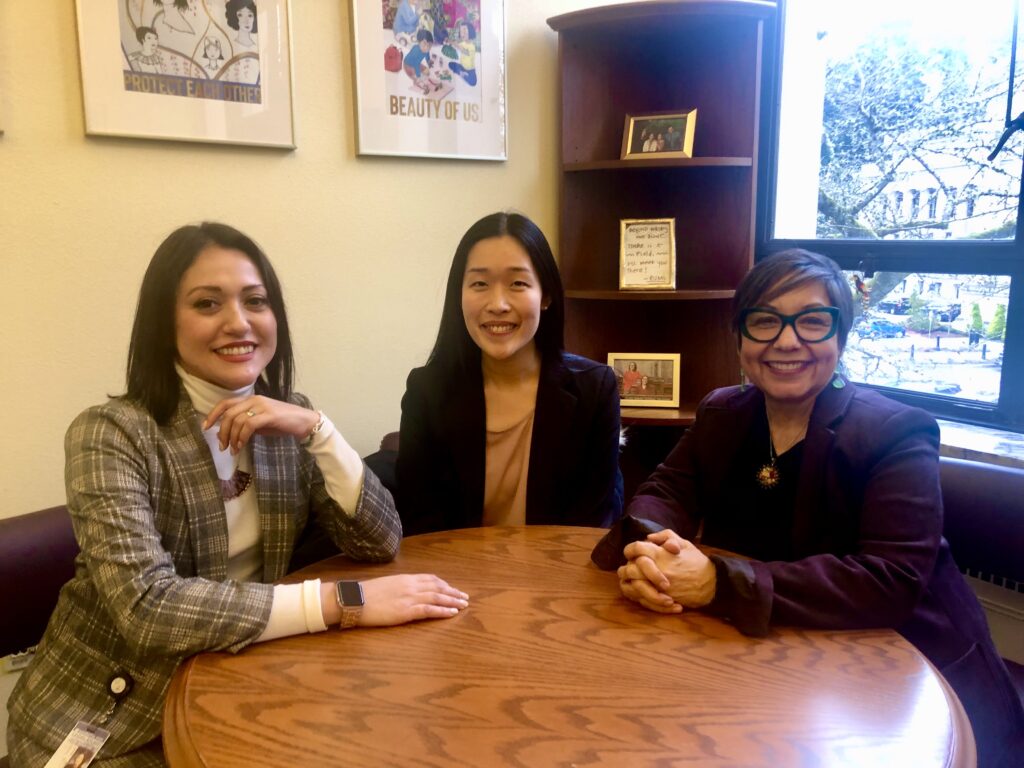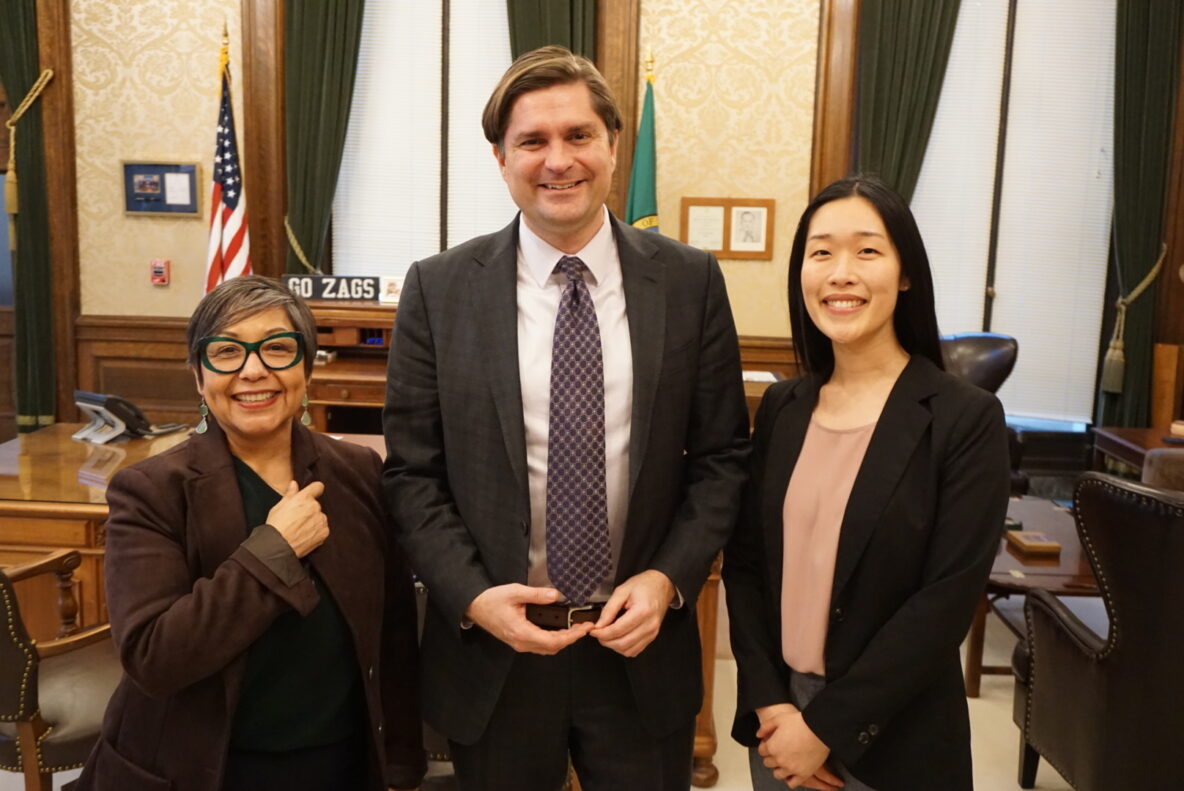By Tracy Yeung and Gabriela Quintana | February 14, 2024

Baby Bonds are an increasingly popular bipartisan government policy in which every child born into poverty receives a publicly funded trust account at birth. This “start-up capital” allows young adults to access education, home ownership, and entrepreneurship, enabling them to build wealth and lead lives that are hopeful, fulfilling, productive, prosperous, and self-directed. Follow our Baby Blogs series to learn about the vision, politics, and people behind Baby Bonds and their transformative impact on the lives of young people, their families, communities, and our economy.
In this installment of Baby Blogs, Tracy Yeung of the Washington State Budget and Policy Center and Gabriela Quintana of the Economic Opportunity Institute—co-leaders of the Washington Future Fund coalition—describe the grassroots movement for Baby Bonds in Washington and outline next steps for making the proposed Washington Future Fund a reality.
Since U.S. Senator Cory Booker and U.S. Representative Ayanna Pressley introduced a Baby Bonds proposal in 2019 to narrow the nation’s racial wealth gap and increase families’ wealth, this transformative policy has caught on at the state and local levels. Connecticut and Washington D.C. have passed their own Baby Bonds legislation. We hope Washington State will be the next state to do so by establishing the Washington Future Fund.
Our organizations—the Economic Opportunity Institute and the Washington State Budget and Policy Center—have worked alongside community partners, legislators, and Washington State Treasurer Mike Pellicciotti for several years to make this happen. Together, we created the Washington Future Fund Advisory Committee and secured funding for a statewide wealth inequity study in 2022.
The study found that while Washington holds one of the strongest economies in the country—with a median household net worth 150 percent higher than the national mean household net worth—the distribution of household wealth is highly inequitable. The study cites a U.S. Census Bureau analysis showing that, in 2010, over half of the total household wealth in the state was concentrated among the top 5 percent of wealthiest households. By comparison, the 50 percent of Washington households with the least wealth held just two percent of the state’s household wealth. Wealth inequality has only increased since then.
The Washington Future Fund is part of the solution. Alongside the work of the advisory committee, we engaged other allies to build a robust and diverse coalition made up of small business owners, local tribal members, credit unions, labor unions, housing advocates, education advocates, and other nonprofit organizations to stand behind the push for change. The coalition has worked to provide feedback on how the Washington Future Fund legislation should look, strategize on how to advance the legislation, and create momentum in communities. This has included strategic op-eds in news outlets.
Due to the coalition’s dedication, passion, and hard work in the last several years, the Future Fund has gained momentum with state legislators as a means to address wealth inequities and support future generations in our state. During the 2023 legislative session, Washington state lawmakers introduced a bill to create the Washington Future Fund.
The Washington Future Fund would invest $4,000 for every baby enrolled in Apple Health (Washington’s Medicaid program) before their first birthday. Participants could withdraw their funds between the ages of 18 and 35 to pay for postsecondary education, purchase a home, or start a business. Almost 40,000 babies a year, or nearly half of all babies born in the state, would be eligible to participate in this powerful program.

Now, along with coalition partners, we are working to continue moving this legislation forward, recognizing that it might take years to get this bill to the finish line. The coalition meets regularly to strategize legislative action, determine the power structures and influencers, and mobilize communities across the state to advocate for this legislation. Members of the coalition regularly meet with elected officials to educate them on the function and intent of Baby Bonds—and the real impact they will have on the lives of kids and families in Washington State. Equally as important, coalition members are engaging in extensive outreach to other organizations and individuals. We now have a list of over 60 groups and individuals engaged in this effort.
During this short legislative session in our state, we want legislators to understand this bill’s positive impact on Washington’s communities and economy. Legislators must move beyond a short-sighted hyper-focus on current budget needs and look toward Washington’s future and its well-being. They need to think big for the future of Washingtonians—especially Black, Indigenous, and people of color who would most benefit from this policy and for whom the asset-building promise of Baby Bonds would help offset long-standing barriers to wealth and opportunity.
Cliff Cawthon, a coalition partner representing Habitat for Humanity, agrees. “Baby Bonds represent a smart and strategic investment in our youth as future homeowners in our community,” Cawthon says. “Habitat for Humanity serves thousands of families in Seattle-King and Kittitas Counties as part of our mission to ensure everyone has a safe and affordable place to live. We understand that an investment like the Future Fund is a long-term strategic investment in homeownership and stability through children being able to invest these funds into homes when they come of age.”
Currently, the Washington Future Fund bills, House Bill 1094 and Senate Bill 5125, sit in the fiscal committees in both chambers and have received bipartisan support. Rep. Monica Stonier (D-49) and Sen. Yasmin Trudeau (D-27) are sponsoring the bills.
In this 60-day legislative session, we are calling on the chairs of the Ways and Means and Appropriations committees to hold hearings for the two bills to give people a chance to testify and speak out in support of Baby Bonds. Public hearings are an important way to engage the public and will help us grow momentum for our campaign throughout the year so we can hit the ground running in 2025 to get this Baby Bonds policy passed once and for all.
Tracy Yeung is a Senior Policy Analyst at the Washington State Budget and Policy Center, where she is a member of the research and policy team, focusing on direct cash policies. She previously held a State Policy Fellowship with the Washington State Budget and Policy Center through the Center on Budget and Policy Priorities’ two-year national fellowship program. Before that, she served as the 2020-2021 Betty Jane Narver Policy Fellow.
Gabriela Quintana is a Senior Policy Associate at the Economic Opportunity Institute. Her portfolio includes economic security issues such as paid family and medical leave and baby bonds. Prior to joining EOI, Gabriela managed her own consulting business, where she worked on social and racial justice and organizational culture and change.
If you missed previous installments of our Baby Blogs series, read them here.
Learn more about Baby Bonds in Washington.
To share feedback on this blog, or for questions about Baby Bonds, email David Radcliffe at radclifd@newschool.edu.
To learn more, explore our Baby Bonds resources.

